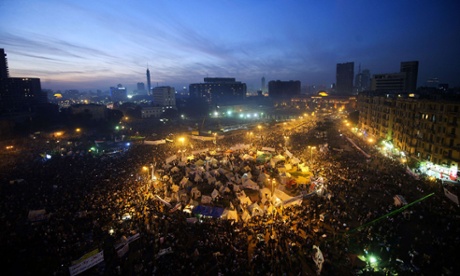Submitted by WA Contents
From Tahrir Square to Emaar Square: Cairo’s private road to a private city
United Kingdom Architecture News - Apr 07, 2014 - 11:45 3215 views
The chants for bread and freedom which rang around Tahrir Square will never be heard in the exclusive shopping mall, luxury apartments and golf course of Uptown Cairo and Emaar Square

An artist's impression of Emaar Square in Cairo. The private development – built on land owned by the military – will be accessed by a private road
In mid-February, the developer behind the world’s tallest building, the Burj Khalifa in Dubai, signed a deal with the Egyptian defence ministry. The agreement clears the way for the construction of Emaar Square, the centrepiece of a mixed-use development – exclusive residential units, a golf course, open-air shopping for international luxury brands – that is part of UAE-based Emaar’s exclusive Uptown Cairo complex.
The defence ministry, which owns the massive tract of land where Uptown Cairo will be built, is Egypt’s largest landowner and manager. In 1997, a presidential decree gave the military the right to manage all undeveloped non-agricultural land – 87% of the country, by one estimate. In the city of Cairo, this translates to massive, walled plots of land in lucrative locations, monitored from watchtowers. Signs forbid photography and identify them as military zones, but no military activity takes place here. They are vacant, awaiting their turn to be transformed into hotels, housing for military officers or upmarket malls.
Emaar Square is the latest and biggest of these military-secured developments. A private road will link it to Cairo’s road network, likely requiring the “cleansing” of the poor homeowners in the Jabal al-Ahmar area. (Egypt’s military has a lengthy track record of forcibly evicting residents, sometimes using lethal force, in favour of private interests – but nearly always citing security as the reason.) This is a private road to a private city – the chants for “bread, freedom, social justice” in Tahrir Square three years ago will not be heard in Emaar Square.
The deal between the defence ministry and Emaar went unnoticed in the news; three years since the revolution, in a way it is business as usual. So how did we get from Tahrir Square to Emaar Square?

The Tahrir Square protests showed how an everyday space can become a site of revolution and transformation. Photograph: Gianluigi Guercia/AFP/Getty Images
The Egyptian revolt is not usually discussed as an urban struggle, one that not only takes place in cities but also seeks to undo the very mechanisms that have produced Egypt’s uneven urban environment. The events of Tahrir Square were a protest against the extreme unevenness of development in Egypt, in which the state neglects the urban majority while providing concessions to Gulf investors and local entities linked directly to the military state apparatus.
In the Mubarak years, the state and its business cronies began a development plan called Cairo 2050. This would have led to the mass eviction of thousands of families, in order to transform the city into pockets of high-end residential development, golf courses and shopping centres. Much of the investment was to come from Kuwait, Saudi Arabia and the UAE. Egypt's former regime was intent on the “Dubai-sation” of Cairo.
The revolution caused an unwanted turn: the Muslim Brotherhood was backed by Qatar rather than Saudi, Kuwait and UAE. But since the military re-took control in July last year, the battle over Egypt’s economy has tilted in favour of the old regime and its supporters, and the old Cairo 2050 projects are back on track, including the Maspero Triangleand Uptown Cairo.
Those who celebrate Dubai's urban model and wish for its expansion across the region make the unethical choice of ignoring the fact that the Gulf cities emerge out of a very specific relation between political power and capital: namely, that they are usually one and the same. The expansion of this model into cities such as Cairo, where the military has unchallenged access both to politics and capital (land, resources, construction), would have a disastrous impact on the urban majority – who will be marginalised, moved out of the way when necessary and put to work under unacceptable conditions, with no power to mobilise and with little pay...Continue Reading
> via The Guardian
